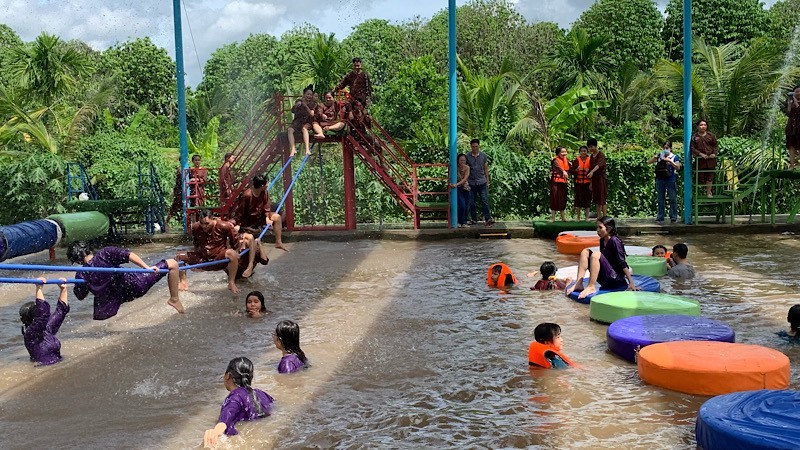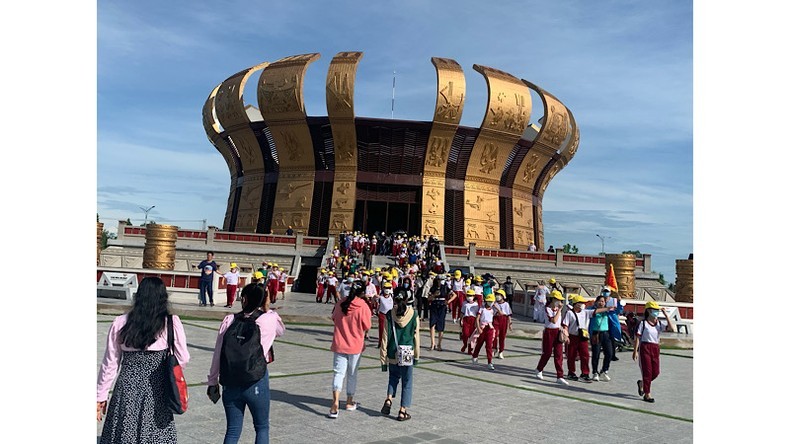Determining waterway tourism and MICE tourism as strengths, Can Tho needs to focus on developing these tourism products to attract more visitors, making tourism a key economic sector in 2025.

Visitors at the Ong De ecotourism area in Phong Dien District, Can Tho.
Waterway tourism has been identified as the primary and distinctive product of Can Tho’s tourism, and the Cai Rang floating market and fruit orchards along the Can Tho River in Phong Dien District will be the main destinations in its waterway tourism development strategy.
Several well-known waterway tourism sites in Can Tho include the Con Son community tourism village in Binh Thuy District and Tan Loc Island in Thot Not District. In Con Son, tourists can visit fruit orchards and farms of exotic fishes from the Mekong River, enjoy traditional dishes and specialties of the southern region, and watch performances of flying snakeheads and frog circus.
Le Ngoc Hau, a tourist from Binh Phuoc Province, said, “The tourism experience in Con Son is truly unique. It is like a miniature southwestern region, where visitors can experience the lifestyle and culture of river-dwelling people.”
In addition, Can Tho is developing urban and high-tech agriculture tourism to make visitors stay longer. Agriculture tourism has taken shape with such facilities as Can Tho Farm, Xa No Farm, Ba Bo Flower Village (Binh Thuy District), Bao Gia Trang Vien (Cai Rang District) and orchards in Phong Dien District, which have attracted large numbers of tourists.
Can Tho has advantages in MICE tourism development, with more than 600 accommodation facilities, many five-star hotels and convention centres, a favourable transport network and a series of shopping centres.

Hung Kings Temple in Binh Thuy District is a popular tourist destination.
MICE tourism is dedicated to high-spending customers using high-quality products and services. Currently, MICE tourism in Can Tho is primarily seen in meetings and incentives. Conferences and events have yet to come up to expectations due to limited infrastructure and human resources, as well as the lack of promotion activities.
According to Nguyen Khanh Tung, Director of the Can Tho Institute of Economics, for Can Tho’s MICE tourism to achieve its full potential, besides tourism infrastructure, the city needs to focus on building and implementing training programmes for the MICE workforce, including skills in event organisation, hotel management and customer service development. Training programmes should include courses on event management in regional and national cultures.
Under a resolution issued by the Can Tho Party Committee in 2021 on developing tourism in a new situation, the city aims to make tourism a spearhead economic sector in 2025 by creating quality, diverse and highly competitive tourism products so that Can Tho will become an appealing destination to both domestic and foreign visitors.
The Can Tho Vice Chairman said that to achieve such a goal, Can Tho will focus on building mechanisms and policies, creating an open tourism environment to attract investment, enhance the training quality for its tourism workforce, expanding cooperation with other provinces and cities, and step-up tourism promotion both at home and abroad.
At the same time, Can Tho is also working on support policies to facilitate tourism development, as well as improving its infrastructure, especially transport infrastructure, to maximise the city’s tourism advantages, potentials and resources.